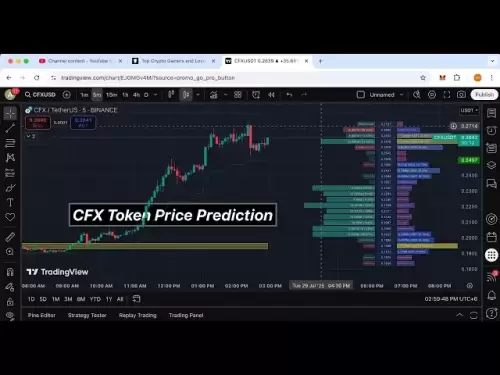-
 Bitcoin
Bitcoin $118300
0.04% -
 Ethereum
Ethereum $3810
0.40% -
 XRP
XRP $3.125
-1.23% -
 Tether USDt
Tether USDt $1.000
0.01% -
 BNB
BNB $814.0
-2.87% -
 Solana
Solana $181.5
-3.39% -
 USDC
USDC $1.000
0.01% -
 Dogecoin
Dogecoin $0.2253
-3.48% -
 TRON
TRON $0.3378
4.40% -
 Cardano
Cardano $0.7871
-2.49% -
 Hyperliquid
Hyperliquid $42.94
-3.09% -
 Sui
Sui $3.834
-6.92% -
 Stellar
Stellar $0.4211
-1.65% -
 Chainlink
Chainlink $17.89
-3.52% -
 Hedera
Hedera $0.2680
-2.70% -
 Bitcoin Cash
Bitcoin Cash $565.5
-3.24% -
 Avalanche
Avalanche $24.71
-6.42% -
 Litecoin
Litecoin $109.0
-1.42% -
 UNUS SED LEO
UNUS SED LEO $8.970
0.04% -
 Toncoin
Toncoin $3.238
-2.25% -
 Shiba Inu
Shiba Inu $0.00001321
-3.69% -
 Ethena USDe
Ethena USDe $1.001
0.01% -
 Uniswap
Uniswap $10.22
-3.53% -
 Polkadot
Polkadot $3.962
-3.43% -
 Monero
Monero $316.4
-2.87% -
 Dai
Dai $0.0000
0.02% -
 Bitget Token
Bitget Token $4.572
-1.47% -
 Pepe
Pepe $0.00001161
-6.32% -
 Cronos
Cronos $0.1443
2.82% -
 Aave
Aave $284.4
-3.07%
How to register a digital currency trading platform? Is KYC required?
Registering a digital currency trading platform requires understanding regulations, choosing a jurisdiction, preparing documentation, implementing KYC, and setting up a secure trading environment.
May 13, 2025 at 03:01 am
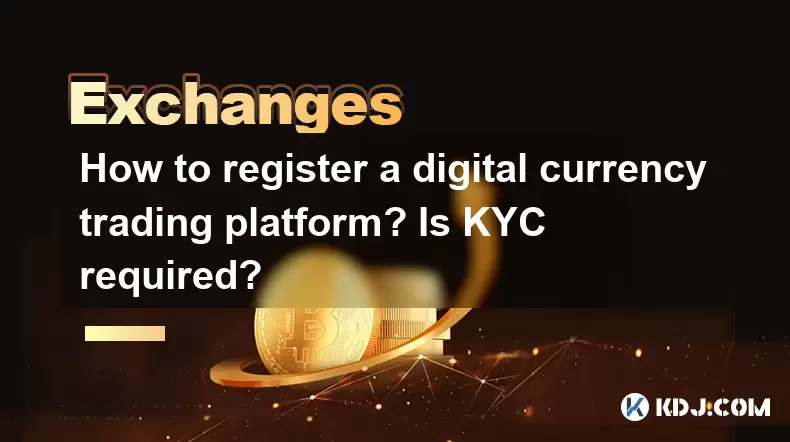
Registering a digital currency trading platform involves several crucial steps that ensure compliance with regulatory requirements and the establishment of a secure trading environment. This process also includes understanding whether Know Your Customer (KYC) procedures are mandatory. Let's delve into the detailed steps of registering a digital currency trading platform and explore the necessity of KYC.
Understanding the Regulatory Environment
Before initiating the registration process, it is essential to comprehend the regulatory landscape for digital currency trading platforms. Different countries have varying regulations, and it is crucial to ensure compliance with local laws. For instance, in the United States, platforms might need to register with the Financial Crimes Enforcement Network (FinCEN) as a Money Services Business (MSB). In Europe, adherence to the Fifth Anti-Money Laundering Directive (5AMLD) is required.
To begin, conduct thorough research on the regulatory requirements in your jurisdiction. This can involve consulting legal experts specializing in fintech and cryptocurrency to ensure all necessary legal bases are covered.
Choosing the Right Jurisdiction
Selecting the appropriate jurisdiction for your digital currency trading platform is a pivotal decision. Some jurisdictions, like Malta and Estonia, are known for being crypto-friendly and have streamlined processes for registering digital asset businesses. Others, such as the United States and Singapore, have more stringent regulations but offer a high level of credibility and investor trust.
When choosing a jurisdiction, consider factors such as the ease of regulatory compliance, tax implications, and the overall business environment. This decision will significantly impact the registration process and ongoing operations of your platform.
Preparing the Necessary Documentation
Once you have identified the regulatory requirements and chosen a jurisdiction, the next step is to prepare the necessary documentation. This typically includes:
- Business Plan: A comprehensive business plan outlining your platform's objectives, target market, revenue model, and growth strategy.
- Anti-Money Laundering (AML) Policy: A detailed policy that outlines how your platform will prevent money laundering and terrorist financing.
- Know Your Customer (KYC) Policy: Procedures for verifying the identity of your users to comply with regulatory requirements.
- Financial Statements: Proof of financial stability, which may include bank statements or audited financial reports.
- Legal Entity Documentation: Documents proving the legal establishment of your business, such as articles of incorporation or a business license.
Ensuring that all documentation is complete and accurate is crucial for a smooth registration process.
Implementing KYC Procedures
Know Your Customer (KYC) procedures are a critical component of registering a digital currency trading platform. KYC is required in most jurisdictions to prevent fraud, money laundering, and other financial crimes. Implementing KYC involves several steps:
- Identity Verification: Users must provide identification documents such as passports or driver's licenses. These documents are checked against databases to confirm their authenticity.
- Address Verification: Users need to provide proof of address, such as utility bills or bank statements, to ensure their physical location.
- Risk Assessment: Based on the information provided, users are categorized into different risk levels, which determine the extent of monitoring and due diligence required.
- Ongoing Monitoring: Continuous monitoring of user transactions to detect and report suspicious activities.
By implementing robust KYC procedures, you not only comply with regulatory requirements but also build trust with your users and protect your platform from potential legal issues.
Registering with Regulatory Authorities
After preparing all necessary documentation and implementing KYC procedures, the next step is to submit your application to the relevant regulatory authorities. This process can vary significantly depending on the jurisdiction:
- In the United States, you would need to register with FinCEN as an MSB and possibly with the Securities and Exchange Commission (SEC) if your platform offers securities.
- In Europe, registration might involve obtaining a license under the 5AMLD and ensuring compliance with the General Data Protection Regulation (GDPR).
- In crypto-friendly jurisdictions like Malta, you would apply for a Virtual Financial Assets (VFA) license from the Malta Financial Services Authority (MFSA).
The application process typically involves submitting the prepared documentation, paying any required fees, and possibly undergoing an audit or inspection. It is essential to follow up with the regulatory authorities and address any queries or requests for additional information promptly.
Setting Up the Trading Platform
Once your registration is approved, you can proceed to set up your digital currency trading platform. This involves:
- Choosing a Technology Provider: Select a reliable technology provider that offers a secure and scalable trading platform.
- Integrating Payment Gateways: Ensure seamless integration with various payment gateways to facilitate deposits and withdrawals.
- Implementing Security Measures: Deploy robust security measures such as two-factor authentication (2FA), encryption, and cold storage for digital assets.
- User Interface Design: Design an intuitive and user-friendly interface to enhance the trading experience for your users.
Setting up the platform requires careful planning and execution to ensure it meets the needs of your target market and complies with all regulatory requirements.
Frequently Asked Questions
Q1: Can I register a digital currency trading platform without a physical office?
A1: Yes, in some jurisdictions, it is possible to register a digital currency trading platform without a physical office. However, you may need to provide a registered agent's address or a virtual office address that complies with local regulations.
Q2: How long does the registration process typically take?
A2: The duration of the registration process varies by jurisdiction. In some crypto-friendly countries, it can take a few weeks, while in others with more stringent regulations, it might take several months. It is advisable to start the process well in advance and be prepared for potential delays.
Q3: Are there any ongoing compliance requirements after registration?
A3: Yes, after registration, digital currency trading platforms are subject to ongoing compliance requirements. These may include regular audits, reporting suspicious transactions, and updating KYC and AML policies to align with changing regulations.
Q4: Can I operate a digital currency trading platform in multiple jurisdictions?
A4: Yes, it is possible to operate a digital currency trading platform in multiple jurisdictions, but you will need to comply with the regulatory requirements of each jurisdiction. This may involve obtaining separate licenses or registrations for each country in which you operate.
Disclaimer:info@kdj.com
The information provided is not trading advice. kdj.com does not assume any responsibility for any investments made based on the information provided in this article. Cryptocurrencies are highly volatile and it is highly recommended that you invest with caution after thorough research!
If you believe that the content used on this website infringes your copyright, please contact us immediately (info@kdj.com) and we will delete it promptly.
- AI Tokens, Ethereum, and Market Leaders: A New Era?
- 2025-07-29 21:10:13
- Linea Airdrop: Ethereum Alignment & the L2 Network's Bold Move
- 2025-07-29 21:10:13
- Crypto Price Predictions: Pepe, Shiba Inu, and the Rise of BlockchainFX USDT
- 2025-07-29 21:50:13
- Hyperliquid, Bitget Token, and Remittix Investment: Navigating the Crypto Landscape
- 2025-07-29 21:50:13
- Shiba Inu, Remittix, and the Quest for 10,000% Gains: A Crypto Face-Off
- 2025-07-29 21:57:08
- Upchuck's 'Forgotten Token' & 'Un Momento': Raw Punk Meets Real Life
- 2025-07-29 21:57:08
Related knowledge
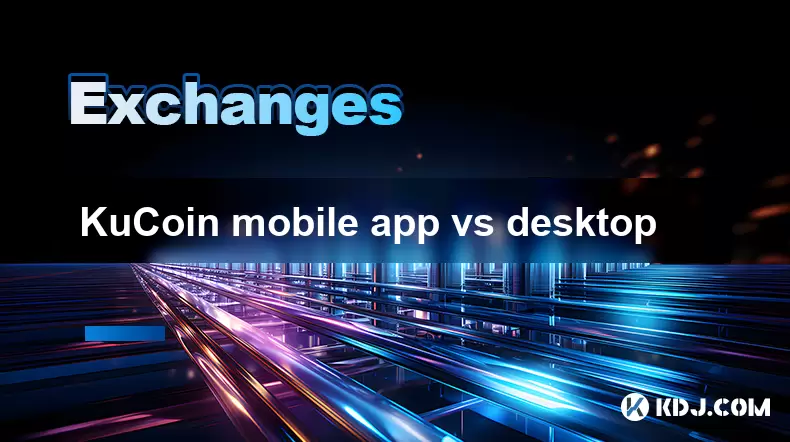
KuCoin mobile app vs desktop
Jul 19,2025 at 08:35am
Overview of KuCoin Mobile App and Desktop PlatformThe KuCoin ecosystem offers both a mobile app and a desktop platform, each designed to cater to diff...
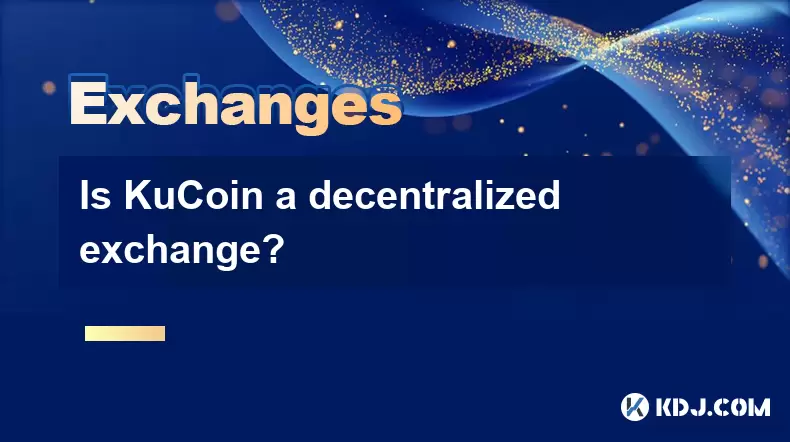
Is KuCoin a decentralized exchange?
Jul 18,2025 at 03:15pm
Understanding Decentralized Exchanges (DEXs)To determine whether KuCoin is a decentralized exchange, it's essential to first understand what defines a...
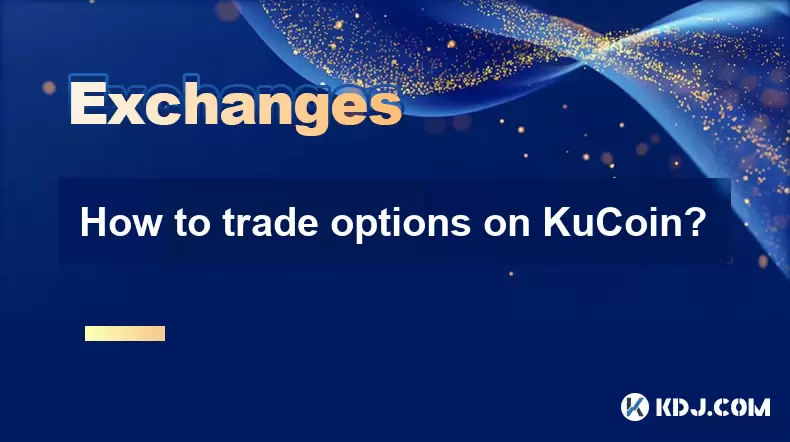
How to trade options on KuCoin?
Jul 19,2025 at 03:42am
Understanding Options Trading on KuCoinOptions trading on KuCoin allows users to speculate on the future price movements of cryptocurrencies without o...

What are KuCoin trading password rules?
Jul 20,2025 at 07:56am
Understanding the Purpose of a Trading Password on KuCoinOn KuCoin, a trading password serves as an additional layer of security beyond the standard l...
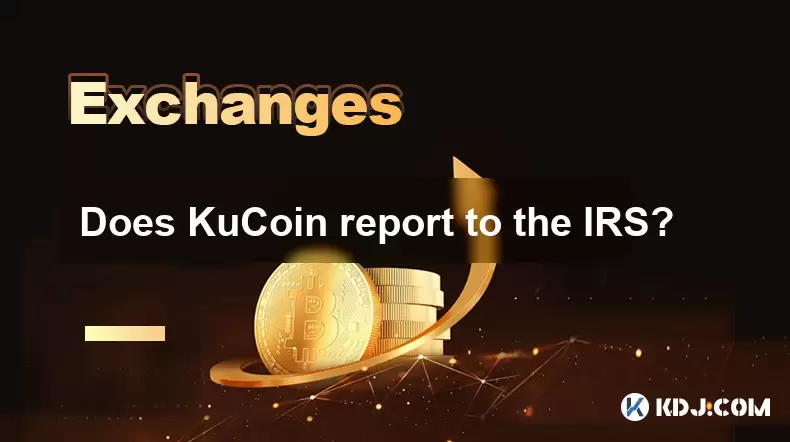
Does KuCoin report to the IRS?
Jul 27,2025 at 05:01am
Understanding the Reporting Obligations of KuCoinCryptocurrency exchanges are increasingly under scrutiny from global tax authorities, and KuCoin is n...

Who is the CEO of KuCoin?
Jul 20,2025 at 09:35am
Background of KuCoinKuCoin is one of the largest cryptocurrency exchanges globally, known for its diverse range of trading pairs and user-friendly int...

KuCoin mobile app vs desktop
Jul 19,2025 at 08:35am
Overview of KuCoin Mobile App and Desktop PlatformThe KuCoin ecosystem offers both a mobile app and a desktop platform, each designed to cater to diff...

Is KuCoin a decentralized exchange?
Jul 18,2025 at 03:15pm
Understanding Decentralized Exchanges (DEXs)To determine whether KuCoin is a decentralized exchange, it's essential to first understand what defines a...

How to trade options on KuCoin?
Jul 19,2025 at 03:42am
Understanding Options Trading on KuCoinOptions trading on KuCoin allows users to speculate on the future price movements of cryptocurrencies without o...

What are KuCoin trading password rules?
Jul 20,2025 at 07:56am
Understanding the Purpose of a Trading Password on KuCoinOn KuCoin, a trading password serves as an additional layer of security beyond the standard l...

Does KuCoin report to the IRS?
Jul 27,2025 at 05:01am
Understanding the Reporting Obligations of KuCoinCryptocurrency exchanges are increasingly under scrutiny from global tax authorities, and KuCoin is n...

Who is the CEO of KuCoin?
Jul 20,2025 at 09:35am
Background of KuCoinKuCoin is one of the largest cryptocurrency exchanges globally, known for its diverse range of trading pairs and user-friendly int...
See all articles





















